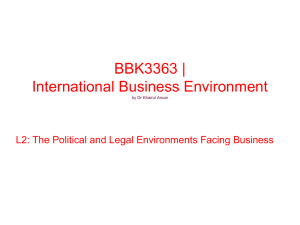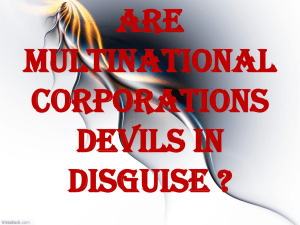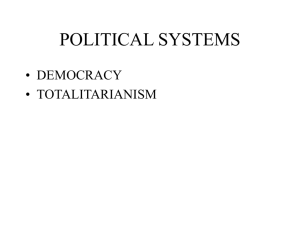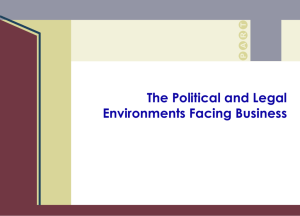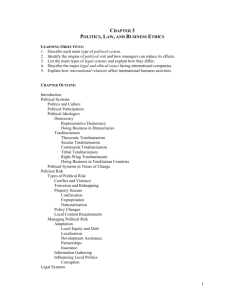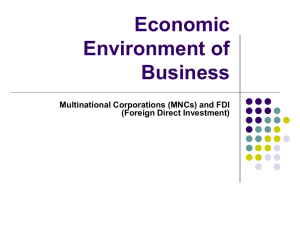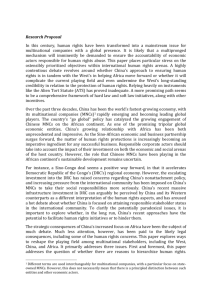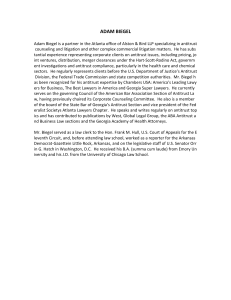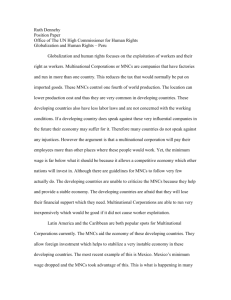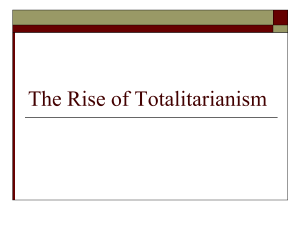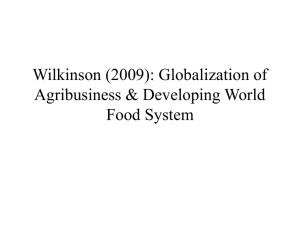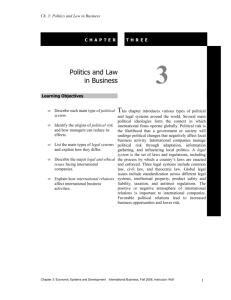Politics, Law, Ethics
advertisement
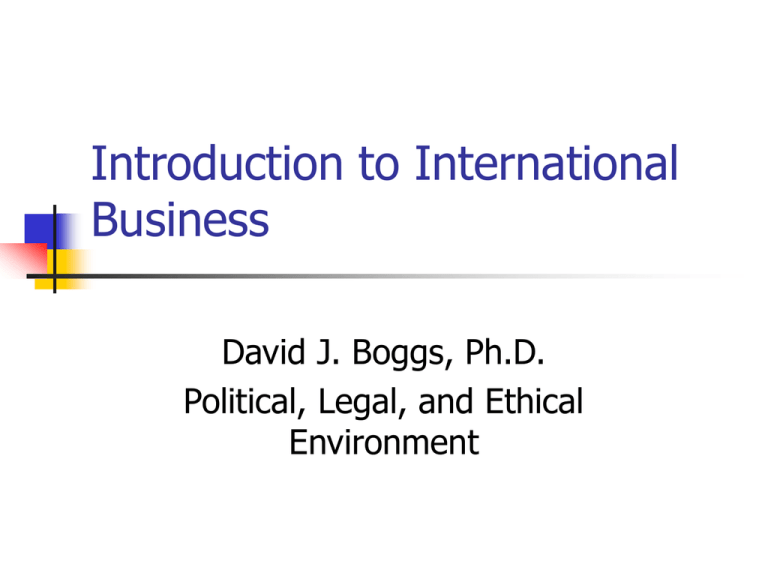
Introduction to International Business David J. Boggs, Ph.D. Political, Legal, and Ethical Environment Functions of a Good Government Protect liberty and promote welfare Provide public goods Freedom, safety, general well-being Parks, defense, infrastructure Handle market failures and externalities Monopolies, pollution Political Rights Fair, competitive elections Power for elected representatives Freedom and ability to organize Safeguard rights of minorities Civil Liberties Freedom of the press Freedom of speech Freedom of movement Freedom of organization Religious freedom Personal social freedoms Equal rights under the law Freedom from government corruption or indifference Totalitarianism High-control government, not supported by the people, that does not permit dissent Theocratic or secular May be friendly or unfriendly to business IB Political Concerns Terrorism, kidnapping, crime Traditional hostilities Secular or religious totalitarianism Nationalization, expropriation, confiscation Regulations and red tape Corruption Poor relations with neighbors Instability, volatility, or frequent changes in government Jingoism (extreme nationalism) or attitudes hostile towards foreigners Country Risk Assessment Political instability Social instability Racial, ethnic, religious, socioeconomic Economic instability Laws, political parties, bureaucracy Inflation, debt, trade barriers, taxes War, revolution, civil disturbances Sources of Country Risk Information Internally generated Consultants International organizations Governments Internet MNC/Government Bargaining Political, legal, and economic situations lead governments to bargain with MNCs MNCs bargaining chips Jobs, technology, money, capital, taxes, management skills, training, development Governments bargaining chips Markets, labor, natural resources, technology, regulations, tax rates, location Legal Environment A countries laws and regulations, and how they are enforced Identify or describe United States laws that affect businesses The Legal Environment Labeling Testing Taxes and tariffs Quotas Advertising Ownership Standards Price and wage controls Antitrust Intellectual property Currency exchange Export requirements Profit remission Customs requirements Labor Product liability Safety Legal Structures Common law Civil law France, Germany Theocratic law United States, United Kingdom Saudi Arabia, Iran Communist and other China, North Korea Tax Laws Revenue and non-revenue purposes Income, VAT, sales, property, tariffs, corporate, capital gains, unitary Incentives, exemptions, and credits Double taxation and tax treaties Tax avoidance Anti-Competitive Practices Laws Monopolies, price fixing, market sharing USA – Antitrust laws EU – Restrictive trade practices laws Japan – Fair Trade Commission Other countries and regions Laws and enforcement vary across countries Intellectual Property Laws Patents, trademarks, trade names, trade secrets, copyrights Software, music, movies, books, fashion, pharmaceuticals Technology transfer and diffusion occurs through employee transfer, industrial espionage, reverse engineering, publications, etc Legal Dispute Resolution Home or host country law Arbitration or mediation Speedy, cheap, trustworthy, confidential UN or WTO Determined by contract or location United States Laws Antitrust applied internationally National rather than territorial tax jurisdiction Foreign Corrupt Practices Act distinguishes between grease and bribes Antiboycott Law Cuba Ethics and Corporate Social Responsibility Behavior consistent with standards of what is right or moral Universal versus relative ethics CSR is going beyond what laws require to address concerns or needs of various stakeholders Summary Good governments protect political and civil liberties of citizens Some countries are more risky than others and international companies generally prefer to operate in less risky countries MNCs gather political risk information through governments, international organizations, consultants, and internal research Common legal systems include civil law, common law, theocratic law, and secular totalitarianism Tax, antitrust, and intellectual property laws are examples of laws important to MNCs
